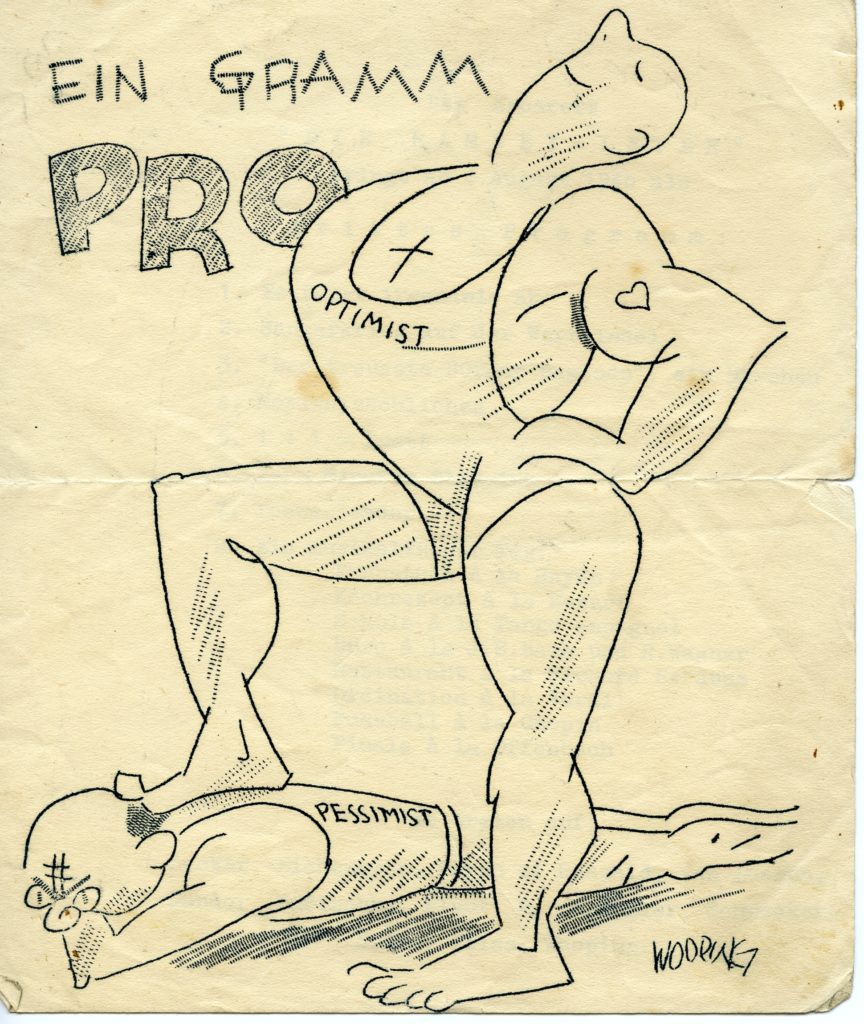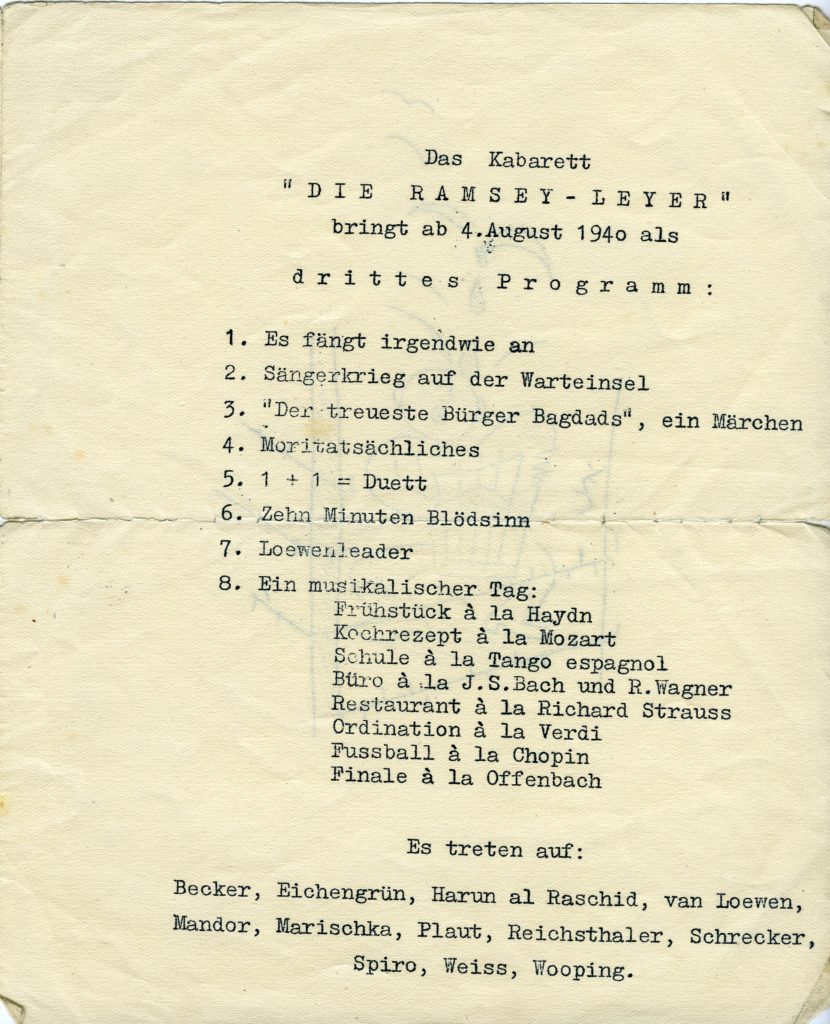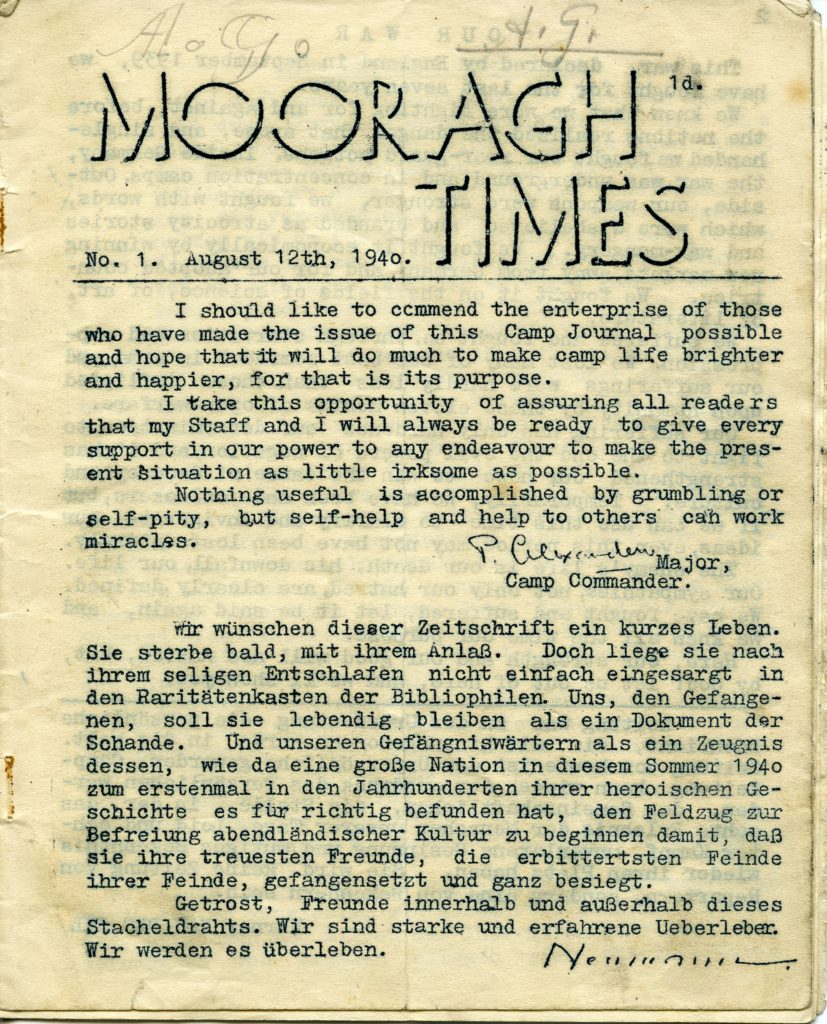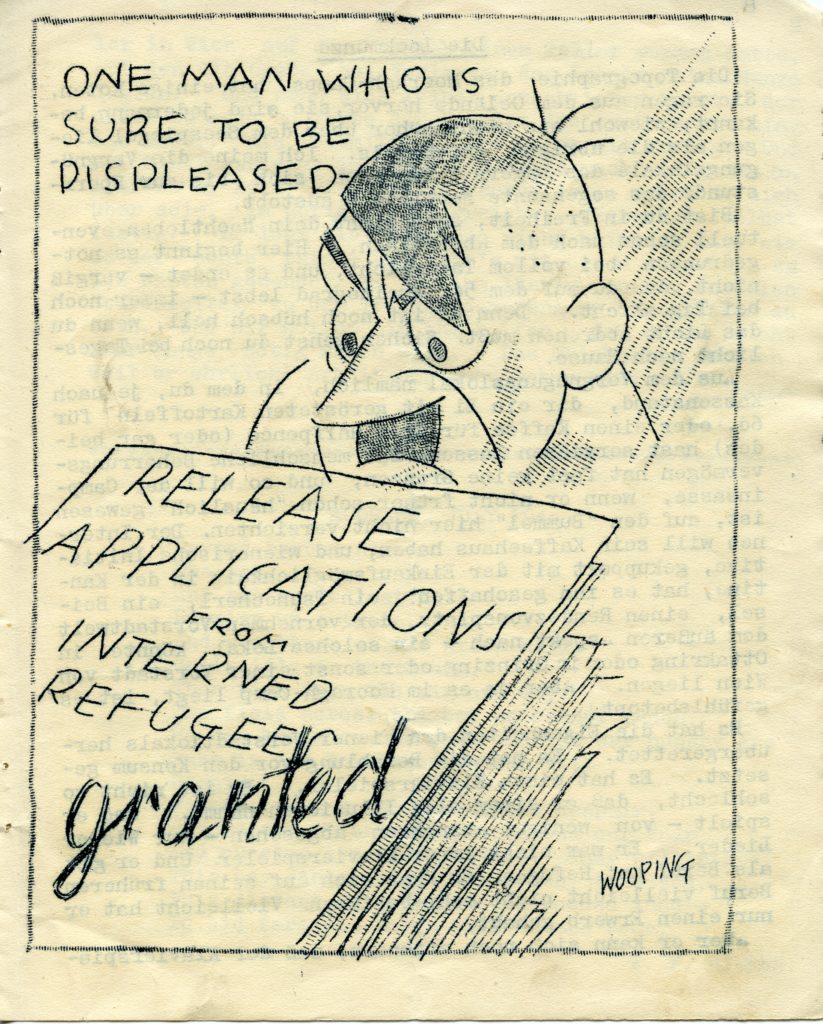Many of the German-speaking refugees interned as ‘enemy aliens’ during the Second World War had backgrounds in the arts, and cultural endeavour flourished in the Isle of Man internment camps. In this blog post, Miller Archivist Clare George looks at the records of some of those activities in the papers of Arnold Gerstle, a Jewish refugee who was interned in Mooragh Alien Internment Camp near Ramsey on the Isle of Man in May 1940.
Gerstle was born in 1893 in Ichenhausen near Ulm in Bavaria, a village of around 2,700 inhabitants with a Jewish community of 300. In 1925 he married Henrietta Urnstein, born in Hesse in 1893 and also of Jewish heritage, and after the Nazis came to power the couple fled to the UK. In 1939 they moved to Tyneside in the UK to take advantage of the government scheme supporting refugees to establish businesses in areas of high unemployment. Together with fellow refugees, brothers Josef and Michael Mayer, Gerstle set up a manufacturing company in Team Valley, Gateshead, initially producing manicure and brush sets but later expanding into sports bags and children’s toys.
Gerstle was one of the first internees at Mooragh when it opened on 27 May 1940, the first internment camp on the Isle of Man. At its peak the camp held 2,900 internees, with whom theatre productions were immensely popular, though sadly relatively few records of these activities have survived. Whether Gerstle himself took an active role in them is not known, but in any case we know that he took the trouble to retain amongst his possessions one of the now rare theatre programmes designed by cartoonist Willi Wolpe (‘Wooping’) for the third Kabarett production by the Ramsey-Leyer, staged in August 1940.


Many of the eleven members of the Ramsey-Leyer were highly experienced theatre performers. Wolpe had co-directed the first cabaret by the Free German League of Culture, ‘Going – Going – Gong’, in London in July 1939. Franz Marischka and Josef Plaut were professional actors, and Fritz Schrecker was also an experienced actor who had worked in political cabaret in Vienna until 1938 and co-founded the Austrian exile theatre, the Laterndl, in London in 1939. Another performer listed is Harun al Rashid, an in-joke whose reference is now sadly lost (at least to the present writer, though she would be delighted to hear if anyone has any insights into this!).
The programme gives few details of the individual items performed, so we can only guess from the titles that some may have been written or adapted in the camp, like the ‘Saengerkrieg auf der Warteinsel’. Others we know were taken directly from Austrian political cabaret and had been brought to the UK by exiles and reperformed in London. The humorous songs collectively titled ‘Ein musikalischer Tag’ were written in Vienna by Hans Weigel and Herbert Zapper, and had formed the finale to the Laterndl’s first production in London, Unterwegs, in the summer of 1939. The third item on the programme, Der treuste Bürger Bagdads was a short play by Jura Soyfer, a young left-wing cabaret writer who was imprisoned by the Nazis in Dachau and had died in Buchenwald in February 1939. Written as a topical satire for performance in Vienna in 1937 and reperformed at the Laterndl in early 1940, the play’s production in internment in the UK would surely have stirred strong emotions and heightened the refugees’ sense of injustice at their situation.

Gerstle’s papers also include the only issue of the predominantly German language internee camp newspaper to have been produced: the Mooragh Times dated 12 August 1940. The 16-page paper features stories, poetry and commentary on camp life and the wider situation of the refugees, clearly demonstrating the self-confidence and ambition of the editors, who included writer Robert Neumann and Rabbi Werner van der Zyl. Several articles reflect on the guidelines on the release of internees published in a government White Paper on 1 August. One internee, Friedrich Steiner, contributed a satirical news report about the discovery of a previously unknown human-like species on the Isle of Man called ‘Interniten’, who busied themselves with writing application forms and adhered to a new religious faith in the mysterious notion of ‘release’. Cartoons with a clear message on the policy of internment, written in English to reach the British authorities, were supplied by Wolpe (who later worked on propaganda art for the Ministry of Information – see https://www.nationalarchives.gov.uk/theartofwar/artists/wooping.htm).

The Camp Commander, Major P. Alexander, used his foreword to the journal to praise the internees’ enterprise in producing it. After the event however, he concluded that it was too critical of the British government’s policy of mass internment, and permission to publish further editions was withdrawn. He advised that the editorial team should instead write something to boost morale and make people laugh. Soon afterwards rules for camp journals were drawn up stating that ‘such journals should be purely for the purpose of brightening camp life and are not permitted as vehicles for complaints and political propaganda of any sort’.
Fortunately these fascinating records of camp life were retained by Gerstle when he was released from the Isle of Man in late summer 1940, and later in the war, when he and his business partners were forced to move their business to Newcastle, the papers went with him. Gerstle gained British citizenship in 1947 and remained in Newcastle until his death in 1958. His wife, Henrietta, died in Israel in 1974. Their papers were kindly donated to the Institute of Germanic Studies by the Gerstles’ son, Mr Jacob Gerstle, in 1998.
This blogpost draws on Jennifer Taylor’s ‘”Something to make people laugh?”: Political Content in the Isle of Man Internment Camp Journals, July-October 1940’ in ‘Totally Un-English?’: Britain’s Internment of ‘Enemy Aliens’ in Two World Wars (2005).
Read more Stories from the Exile Archives
Dr Clare George, Archivist (Martin Miller and Hannah Norbert-Miller Trust), Research Centre for German and Austrian Exile Studies, IMLR.

Well we definitely need something to laugh at in the present Covid-19 crisis! What a timely and pertinent contribution to draw upon, highlighting positive efforts to counter the detrimental impact of internment. Thank you!